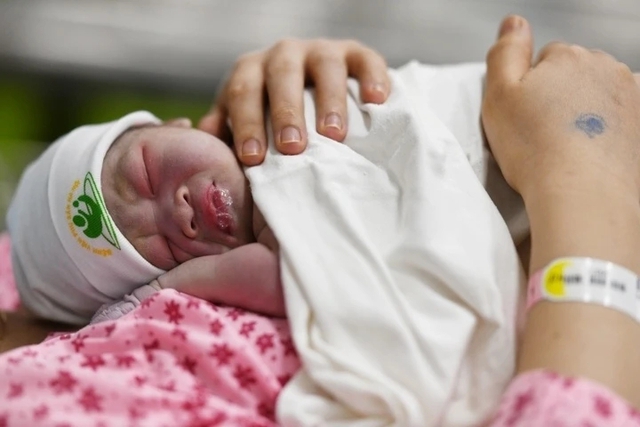Health ministry proposes cash rewards for families with two daughters
VGP - The Ministry of Health has proposed offering cash and material support to families with two daughters, aiming to address two growing challenges: declining birth rates and a persistent cultural preference for sons.

A newborn baby girl at the Ha Noi Obstetrics and Gynecology Hospital
Specifically, the ministry suggested a package of VND 650 billion (US$28 million) to support women who have two children before the age of 35, and over VND 151 billion (US$6.5 million) for families raising two daughters.
In addition, the ministry is advocating for stricter penalties on illegal sex-selection practices, proposing to raise the maximum fine from VND 30 million to VND 100 million (US$4,000 as the existing sanctions are too weak to deter violations.
Health Minister Dao Hong Lan said that Viet Nam is facing a dual crisis: a shrinking population and a surplus of men.
The national birth rate has fallen to a historic low of 1.91 children per woman, well below the replacement level of 2.1. With smaller families becoming the norm, many parents are using prenatal technologies to ensure their only child is a boy.
Meanwhle, Viet Nam's sex ratio at birth has remained around 111 boys for every 100 girls since 2009, significantly above the natural ratio of 106.
The minister emphasized the need to promote two-child families—especially those with girls—to help restore long-term demographic balance. The ministry plans to submit the proposed law to the Government in December, with a view to presenting it to the National Assembly in 2026.
The imbalance is most pronounced in northern provinces such as Bac Ninh and Vinh Phuc (118.5), Ha Noi (118.1), and Hung Yen (116.7). Other provinces including Bac Giang, Son La, Lang Son, and Phu Tho also report ratios exceeding 113. In contrast, southern provinces remain closer to the natural range, between 105 and 108.
If current trends persist, Viet Nam could face a surplus of 1.5 million men aged 15 to 49 by 2034, rising to 1.8 million by 2059, according to projections from the General Statistics Office.
Experts warn that this growing gender imbalance could lead to social instability, a rise in human trafficking, and increased pressure on the marriage market./.

